When it comes to selling online, keywords are king. Using the right keywords can increase visibility, win Buy Box placement, and rank ahead of the competition in paid and organic search results.
While it’s possible to do keyword research manually, it’s not recommended—without tools to help you assess strengths and analyze the market, it’s easy to fall behind. From reviewing the ranking potential of both short and long-tail keywords to helping you work through match types, the best Amazon keyword research tools can give you the support you need to reach sales success.
-
- Trellis
- Ahrefs
- Merchantwords
- Keyword Tool Dominator
- Keyword Tool
- Helium 10
- Sellesta
- Sonar
8 Best Amazon Keyword Research Tools
1. Trellis
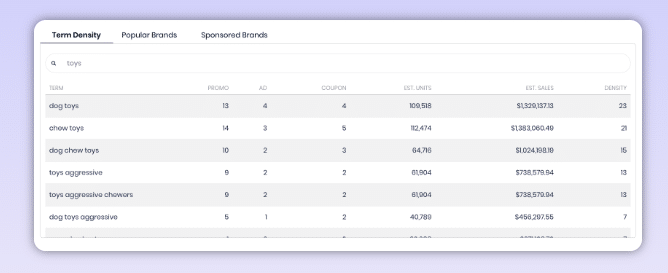
Trellis is an eCommerce powerhouse, helping users tackle every aspect of selling online. This includes a highly advanced AI-driven research tool that considers every aspect of optimization for organic results and creating PPC campaigns, from gauging keyword difficulty to insights into market changes. Cost estimation tools are also available and allow users to keep budgets in line and maximize ad spend for higher conversion rates.
Trellis also offers insight into the competition, leveraging an analysis of keyword use by other similar brands. This allows you to continually refine your strategy to ensure you get the most bang for your buck. And, with the ability to integrate into Amazon’s interface, you can cover all of your bases with support from Trellis. Prospective users can even use the free research tool to explore how Trellis addresses various keyword needs.
In addition, Trellis’ paid product content module shows you how well certain keywords are converting using your search terms report. Providing color-coded recommendations based to you while you update your listing’s content.
This is just one of many ways Trellis’ platform integrates the 4 Ps—Product, Price, Promotion, and Place—giving you tools designed to support your eCommerce objectives. With these features, it’s easier than ever to take your sales strategy to the next level.
Pros
-
- Thorough approach to keyword management with a full suite of analytics.
-
- Amazon marketplace integration for a user-friendly experience.
-
- Comprehensive access to Amazon search terms reports and other research tools.
Cons
-
- With robust features targeting almost every area of eCommerce support, this tool may go beyond what users with simple needs require.
Key features
-
- Keyword Conversion Opportunities,
-
- Competition analysis,
-
- Integration with other key profit-driving activities,
-
- PPC campaign builder,
-
- Cost estimation tools,
-
- Extensive reporting options.
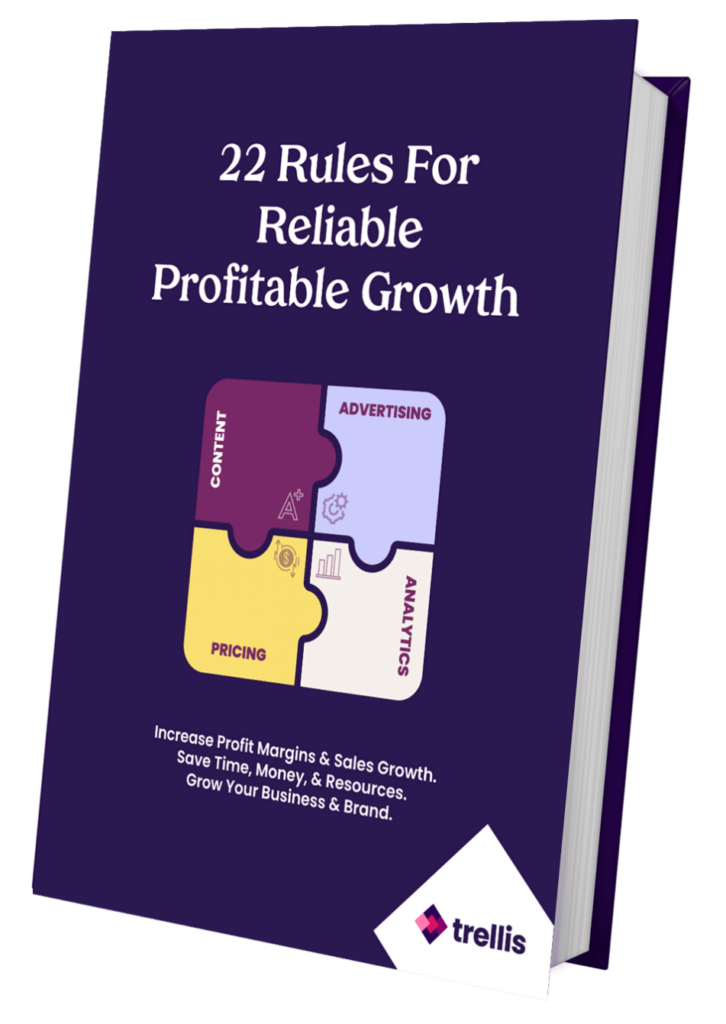
22 Rules to Increase Amazon Sales Up to 450%
Find out the proven framework we used to increase Amazon sales by 450%.
2. Ahrefs
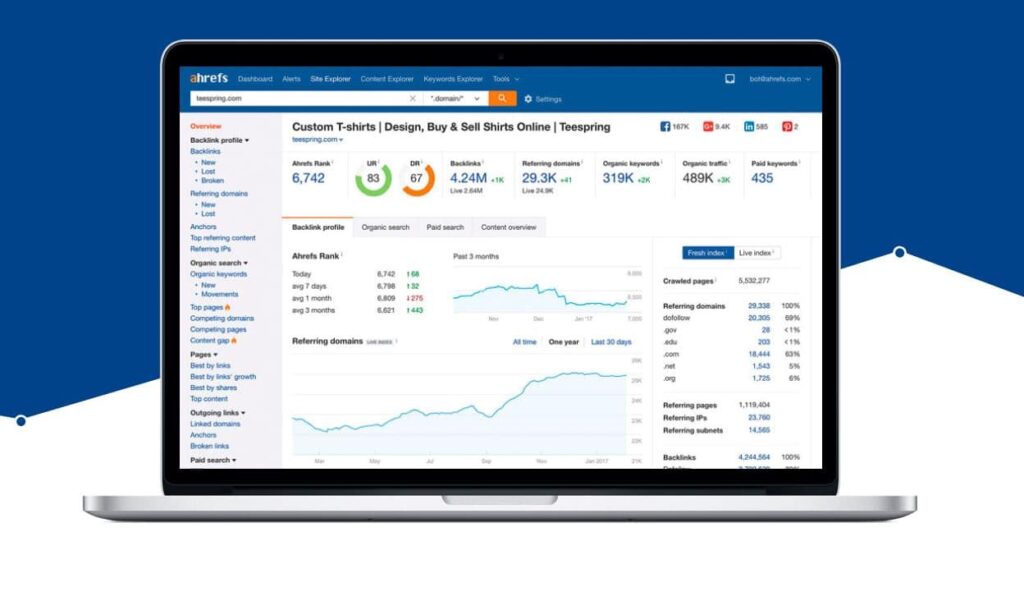
With a database of over seven million keyword combinations, Ahrefs makes research fast and easy, even if you’re new to the eCommerce game. The metrics dashboard allows for quick and easy research as marketing needs evolve. This includes what position a product or page hits in the SERPs for every keyword in use—up to 10,000 at one time.
Ahrefs can be a great choice for sellers outside the U.S. as well; the platform supports 171 countries as well as multiple search engines. Flexible and functional for needs on Amazon and off, this tool is popular for a reason.
Pros
-
- Access to an extensive array of keywords and phrases.
-
- A simple, straightforward approach to analytics on the Ahrefs dashboard.
-
- Compatible with numerous search engines.
Cons
-
- No free plan options.
-
- Limited access to resources without paying for a premium plan tier, which can also include usage-based pricing.
Key features
-
- Over seven million keyword combinations,
-
- Search up to 10,000 keywords at once,
-
- Support for 171 countries.
3. Merchantwords
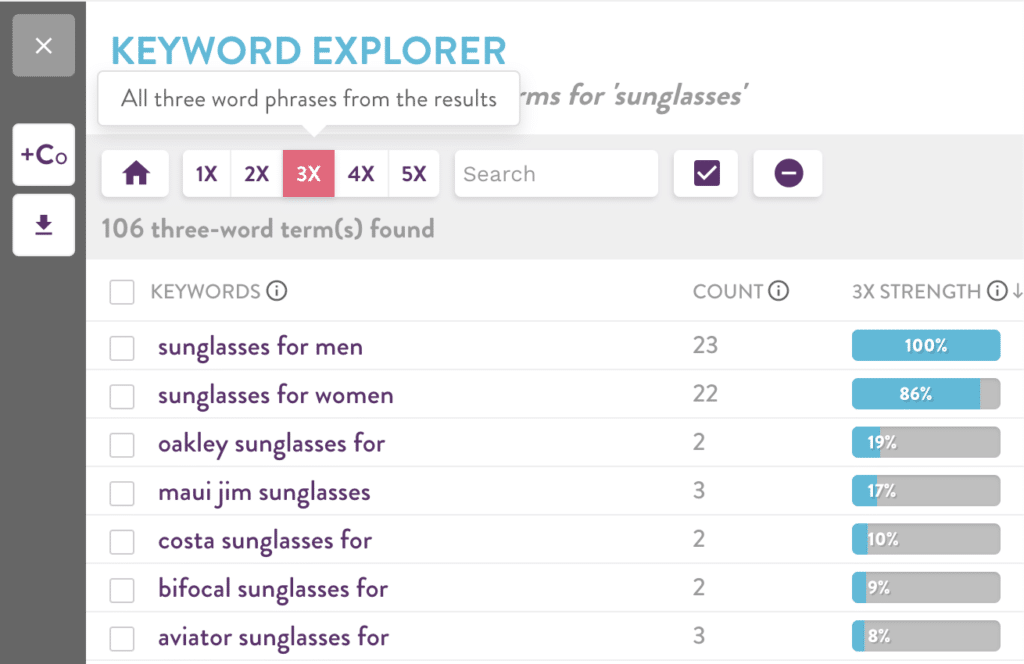
With a focus on ease of use, Merchantwords users can get their keyword research resources up and running in a matter of minutes. The platform is customizable based on goals; users can use five unique tools that users can mix and match as needs evolve. These include Classic Search, ASIN Plus, Digital Shelf, Emerging Trends, and Page 1 Products. Search, analyze keyword strength, drill down into keyword options by word count, and filter out duplicates and irrelevant options all in one straightforward tool. Keyword generation is also available, handling heavy lifting to save you time and maximize available options.
Pros
-
- Limited free Amazon reports on the Merchantwords website for affordable use.
-
- Explores trending keywords across numerous Amazon sites.
-
- Makes keyword management easy.
Cons
-
- Expensive subscription options.
Key features
-
- Five unique tools,
-
- Keyword generation,
-
- Customizable platform.
4. Keyword Tool Dominator
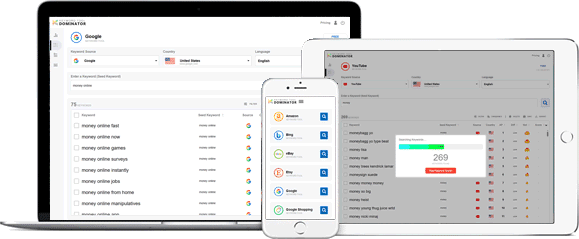
If affordability is the goal, Keyword Tool Dominator has what you need. Unlike more comprehensive tools that can support multiple aspects of eCommerce management, this resource is focused on one thing and one thing only: keyword research. And, for those on a tight budget, basic access to the tool is completely free.
In addition to the straightforward features common across most comparable platforms, Keyword Tool Dominator has a complex autocomplete database to see what real users are searching across numerous marketplaces. Trends in keyword use are constantly updated, making it easy to get a jump on the competition.
Pros
-
- Limited free Amazon keyword tools and a low flat fee for lifetime access.
-
- Keyword-specific resources that aren’t bogged down by unneeded eCommerce tools.
-
- Unique autocomplete database.
Cons
-
- Limited functionality compared to more robust keyword research platforms.
Key features
-
- Deep keyword research,
-
- Autocomplete database,
-
- Consistently updated keyword trends.
5. Keyword Tool
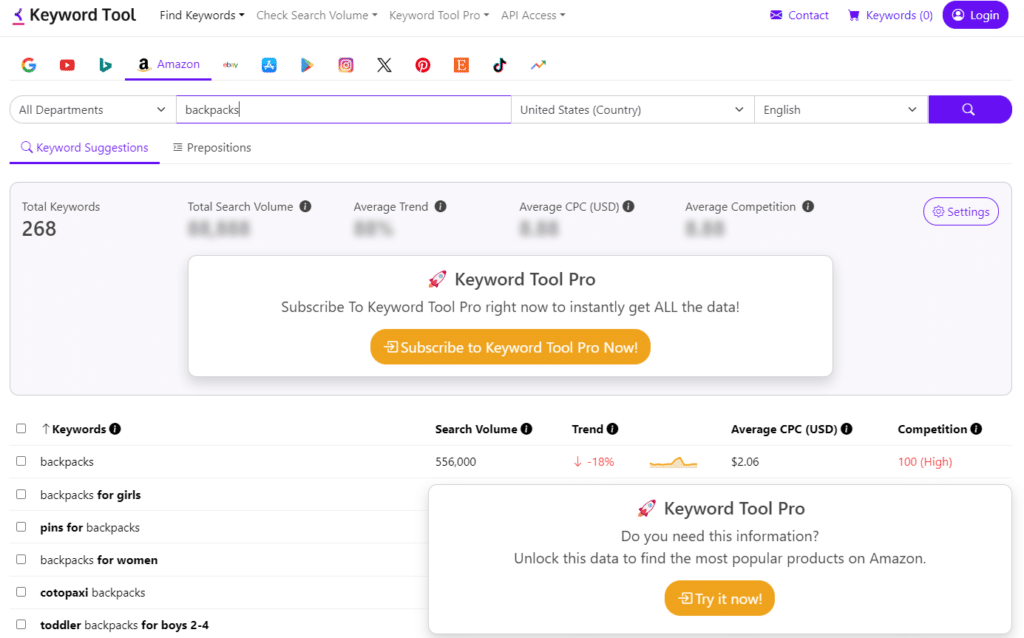
As the name implies, Keyword Tool is just that, and it provides a resource for businesses of all sizes. With the ability to compile 750 or more long-tail keywords for every search term, as well as taking advantage of Google auto-complete and Google Suggest, users can access targeted and informed results in a matter of seconds.
While Google is a key focus, Keyword Tool allows users to toggle between Google and Amazon’s marketplace quickly and easily. And, with free access, users can get a feel for the platform before investing in the costlier paid option.
Pros
-
- Keyword research is informed by Google’s unique approach to keyword suggestions.
-
- Support across Google and numerous other marketplaces.
-
- Free access to basic research tools that will satisfy the needs of many small or limited businesses.
Cons
-
- Premium tools require a paid subscription.
-
- No support for other eCommerce needs.
Key features
-
- Available in over 80 languages,
-
- Compile over 750+ long-tail keywords,
-
- Compatibility with Google auto-complete and Google Suggest.
Increase Profit Margins By 12%
Implement the 3 advanced PPC strategies that our clients use to sell on Amazon more profitably.
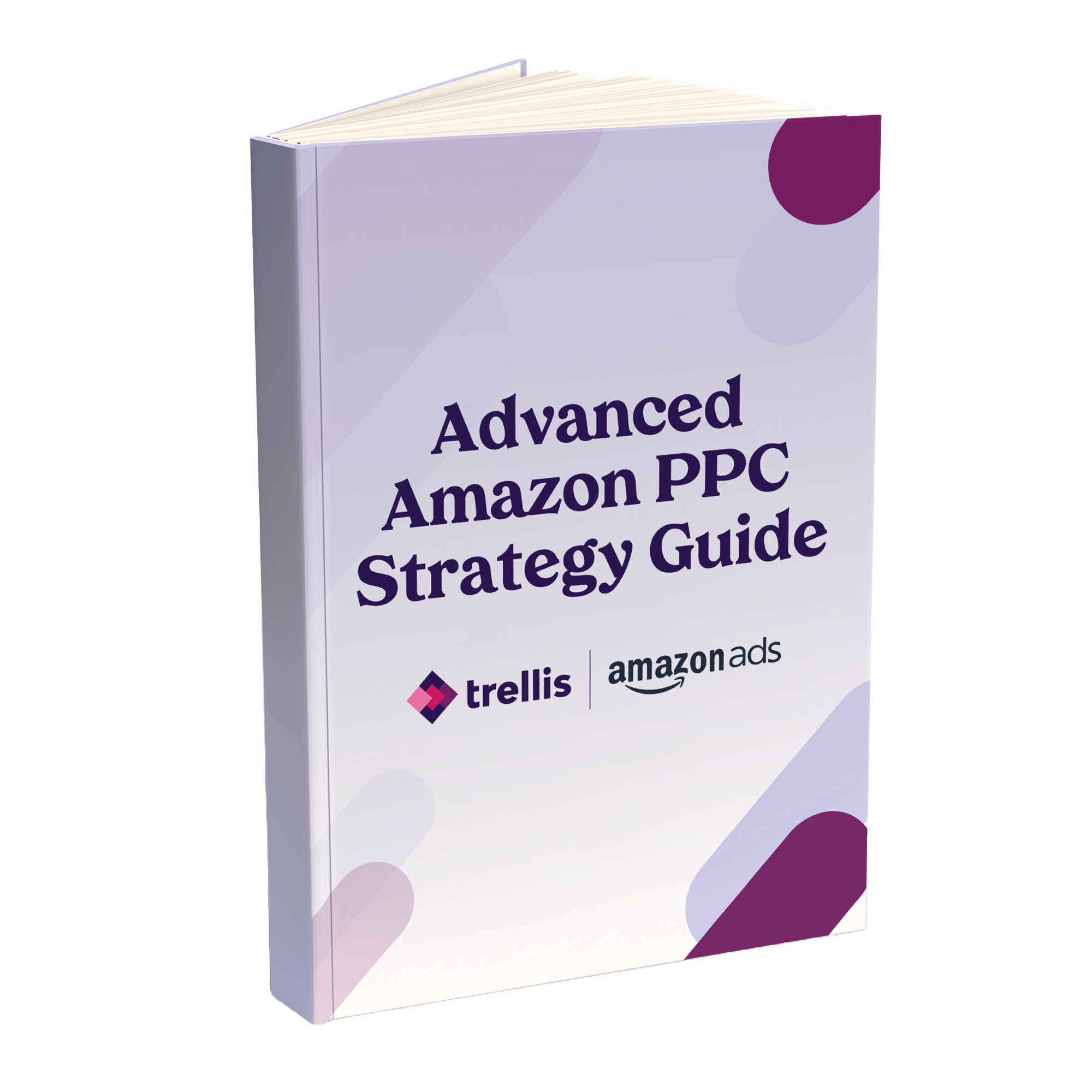
6. Helium 10
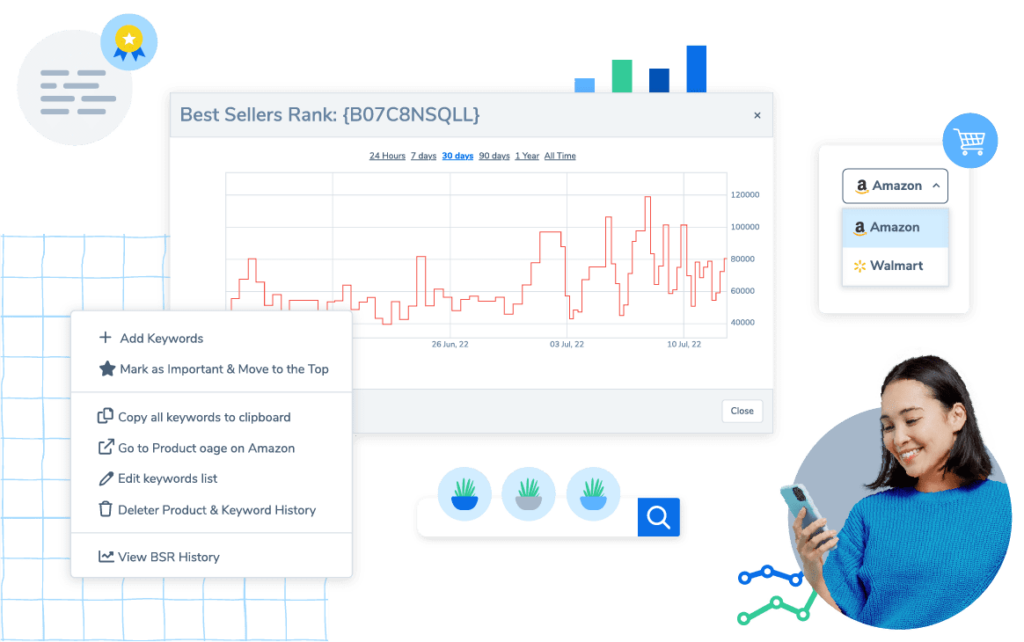
Helium 10 is a well-known platform in the business for eCommerce management, in no small part due to its robust keyword research tool. A single dashboard can display results for both organic and paid keywords and with the unique Boost tool, it’s possible to track ranking data for “boosted” keywords hourly across a 10-day period.
Helium 10 offers keyword management resources across numerous segments, like research and optimization, keyword tracking, and reverse ASIN searches. This also includes a custom ranking approach called Magnet IQ that assigns number scores based on search volume ratios.
Pros
-
- Many ways to track and manage keywords.
-
- A comprehensive platform that can meet other eCommerce needs.
-
- Boasts platform-specific tools like Boost and Magnet IQ.
Cons
-
- No free version and steep pricing for paid tiers.
Key features
-
- Boosted keywords,
-
- Proprietary Magnet IQ numerical scores,
-
- Keyword tracking and ASIN research.
7. Sellesta
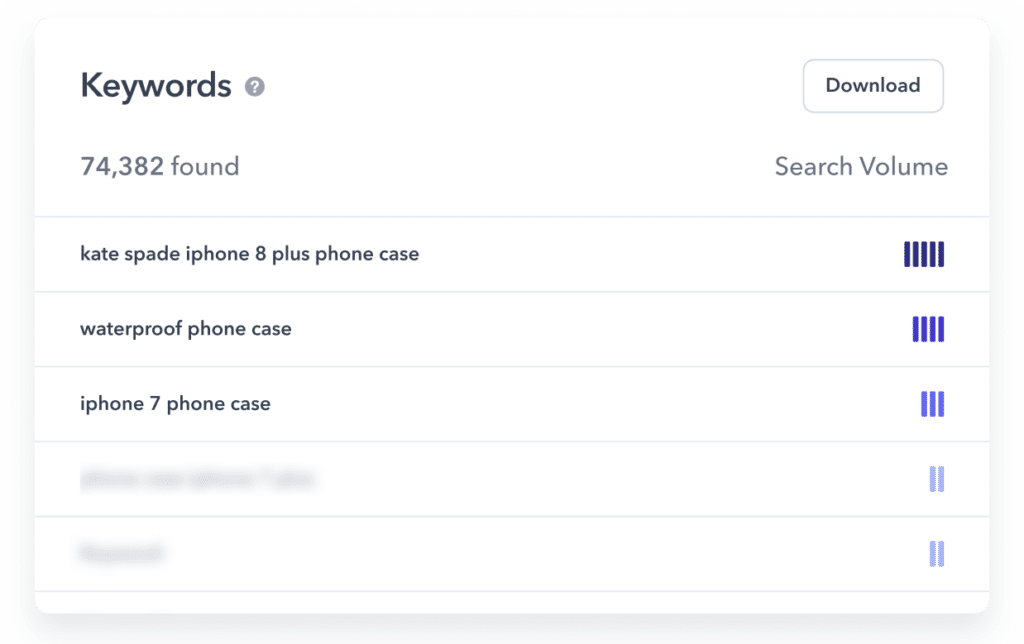
Sellesta is all about AI-powered solutions to grow eCommerce businesses of all sizes. The Sellesta Amazon Seller Tool boasts a wide array of opportunities, including options for keyword research. With a two-pronged approach combining keyword use with optimization resources, Sellesta examines how keywords contribute to sales funnels.
Get daily updates on keyword performance, identify keywords in use that aren’t benefiting your visibility, and see how competitors are leveraging their keyword strategies. Basic tools are available, so users can get a limited look at how the process works.
Pros
-
- A powerful suite of tools serving over 300 million users worldwide.
-
- An AI-driven approach that combines new technology with modern sales strategies.
-
- Impressive history of revenue growth; many users see as much as a 25% increase in revenue.
Cons
-
- For sellers with straightforward needs, Sellesta may offer far more than is necessary, especially since keyword research is only one part of the bigger picture.
Key features
-
- Comprehensive Amazon Seller Tool covering multiple aspects of eCommerce support,
-
- Free website-based tool,
-
- Competitor analysis.
8. Sonar
A sleek and efficient keyword tool, Sonar offers free and paid resources for research and analysis. This includes options like Amazon PPC campaign guidance and search volume metrics for in-depth information on what your business needs to do to outrank the competition.
Sonar uses a prediction algorithm that helps users understand approximate keyword use, like the probability of keyword appearance and real-life results, to inform buyer strategies. For full access to this tool, a monthly subscription is required.
Pros
-
- Accessible free tools that can help small businesses with limited needs.
-
- Clean and simple interface with access to some Amazon platforms; increased expansion in the works.
-
- Keyword volume prediction.
Cons
-
- Expensive subscription.
-
- Search is limited to ASINs ranking on the first page of Amazon at the time of database updates.
Key features
-
- Free and paid research tools,
-
- Amazon PPC campaign guidance,
-
- Keyword volume prediction algorithm.
Why do I need to do Amazon keyword research?
For businesses just starting out in the world of eCommerce, the vast and varied number of keyword research tools available can seem overwhelming, leaving startups and small companies asking, “Is this really necessary?” For anyone who wants to grow their operations, the answer is yes. Your competitors are surely using these tools to hone their sales strategies, so there’s a good chance you’ll get left behind if you don’t use them, too. Here are some of the top reasons to keep in mind when selecting the best Amazon keyword tool for your business:
Increase product visibility
To sell on Amazon, buyers need to be able to find your product, which can be tough to do if you don’t know how to make that happen. Few buyers will scroll through more than a page or two of Amazon results, so you’ll be out in the weeds if your products are not found here. With a proper approach to keyword research, you can overcome the competition and rise to the top.
Generate product ideas
It’s hard to find a way to enter into a new space when you’re not sure what’s ranking and why in your industry. Keyword research can help you see saturation in the market, including where there may be openings. This can guide product development or sourcing ideas, providing a way to maximize revenue that may be otherwise hard to pinpoint.
Increase Amazon sales
Improving keyword use has one big benefit every business targets: increased sales. Learning how to use profitable Amazon keywords both organically and as a part of PPC campaigns means that your products will not only show up more in sponsored ad spots, but in searches of all kinds. And, once on a product page, shoppers can easily see how your offering is better than the rest. By targeting the right paid keywords, you can spend your dollars more efficiently, leading to more sales-focused medium-tail keywords, as opposed to low-intent expensive search terms.
Considerations when selecting a keyword research tool
Despite the high-level similarities in the above tools, they’re not all equal. When weighing your options, here are some key points to help narrow them down:
Search limits
Some platforms, particularly free or low-cost options, put limits on the amount of keywords you can search at a time. If you need access to plenty of Amazon keywords and their search volume, these limits can make it very challenging to gain the insights you need to succeed.
Scope of metrics
Many keyword platforms differ in their overarching priorities, and that includes the kind of information made available. If you need access to metrics that go beyond the basics of research, a more robust platform specializing in analytics will be a better choice.
User experience
When it comes to key elements researching keywords, a complex dashboard that requires a lot of trial and error to learn can be a major detraction. Instead, you should focus on options that ensure you can quickly gather information to make informed decisions. Keyword optimization can be easy with the right tool yet cumbersome with the wrong one, so factor in the ease with which you can get the info you need.
Price
The cost of a tool, particularly for small businesses with growth goals, will always play a role. Rather than simply focusing on the lowest price—an often tempting strategy— consider what you’re getting for that price. The cheapest option isn’t always the best option, particularly if your needs go beyond simple keyword analysis.
Synergies
As mentioned, keyword research is done by every successful Amazon business. The best way to differentiate is to find creative ways to leverage these search term gold mines. Having a platform that allows you to execute effectively with this data across different profit-driving activities is vital.
3 tips for Amazon keyword research
What you get out of keyword analysis will depend on how you’re using the tools at your disposal. Alongside the platform you choose, keep these keyword research tips in mind:
-
- Use your competitors
Are your competitors outperforming you? If so, it might be time to take a page out of their book. By leveraging what’s succeeding in the market, you can increase the visibility of your own products. In addition, examining how your competitors approach keywords can expose weaknesses in their strategies, creating an opportunity for you to get the upper hand.
-
- Think about your customers
Trying to beat the competition and increase visibility are important goals to have, but only focusing on these factors may mean neglecting the people who matter most: your customers. In addition to higher rankings, your keyword strategy should support the benefits and features that will make a shopper click “Buy Now.” Increased visibility won’t make a difference if keywords don’t align with what you have for sale.
-
- Use long-tail keywords
Long-tail keywords are more exact search terms that align closely with what a shopper actually enters into a search bar. Competition for shorter, more generic keywords can be intense, but the more specific term you use, the better your chances to shine. For example, if you sell women’s shoes, “black leather high-heeled pointed toe pumps” will have far less competition than “women’s heels.” Keyword research tools can help establish the best terminology fit for your products, offering both long-tail and short-tail resources.
Optimizing product listings for keywords
In order to ensure the Amazon algorithm works best for you, it’s important to optimize your product content as efficiently as possible—and that means the right approach to keyword use. Include the most important keywords in your product descriptions, product titles, and even in lists of product specs and benefits where appropriate. This can include back-end keywords as well—keywords attached to your listings that customers can’t see.
The best resource for optimizing product listings is a robust eCommerce platform with keyword research as a central element in a broader suite of tools. For a complete solution for your keyword and eCommerce strategies, contact Trellis today to schedule your free demo.
Amazon keyword research frequently asked questions
Keyword research tools generally work by farming keyword information from source sites, like Amazon, and using it to provide relevant keyword matches that can be worked into your optimization strategies.
Most keyword research tools are fairly accurate, providing valuable insights you can use to refine your approach to SEO. Generally, they can help you understand the relationship between different keywords in your category, giving you a sense of volume and competition, while specific metrics could be off. However, what’s important is your knowledge of your industry and how you apply these learnings; otherwise, you may not be using the right seed words at the start of your research process.
Analyzing the competition works by compiling information used by sellers with similar products. Competitor analysis using a reverse ASIN search shows you exactly what keywords are pulling the most weight, highlighting where you can improve in order to remain competitive.
Amazon permits up to 1,000 keywords per ad group; back-end keywords are limited to 250. Sellers are also required to keep product titles to a maximum of 80 characters, so it’s best to only use a primary keyword; and save others for the product description.





